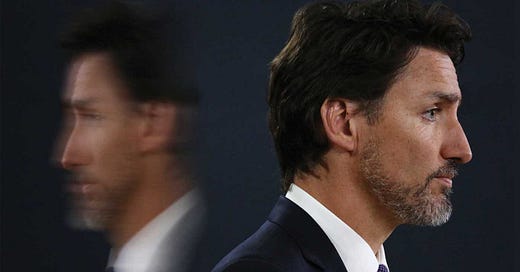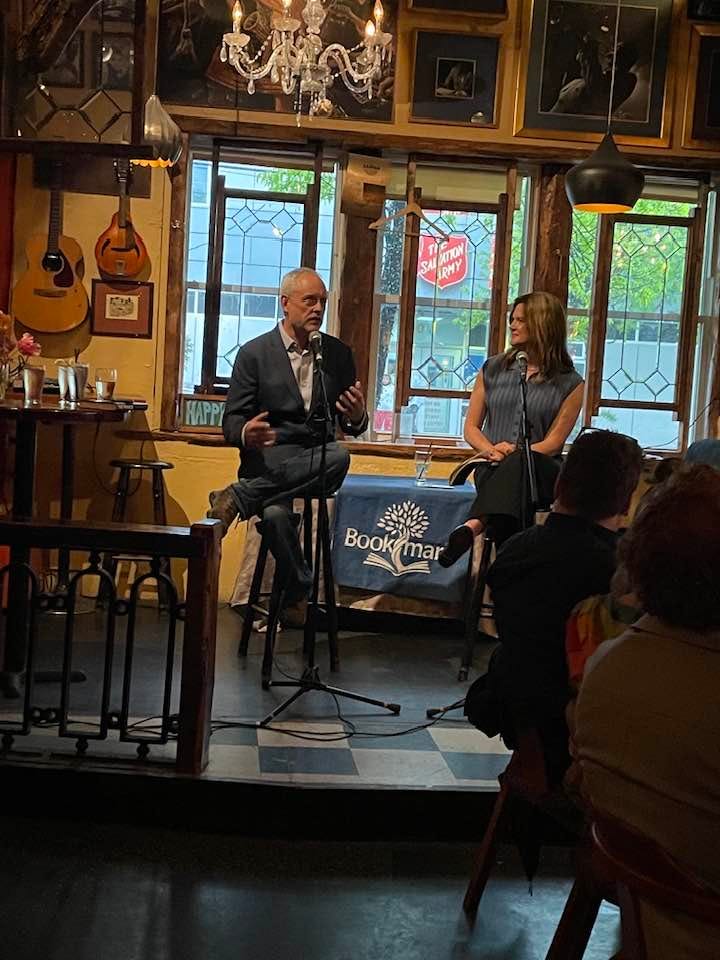Tonight, along with many friends, family, and locals whose consciences simply won’t release them from the problems of the day, I attended the book launch for Stephen Maher’s new book on the career of Justin Trudeau.
I’m as astonished at the pure level of hatred some folks have for Trudeau these days as I was by the level of fandom he generated in the early days.
Stephen Maher’s "The Prince" is an important book.
As a friend and fan of Maher's work, I can say without hesitation that this book marks a high point in his career. With the sharpness of a seasoned journalist and the insight of a historian, Maher writes from inside the enigmatic world of Justin Trudeau, revealing the real complexities of the man behind the political façade.
It's over a decade since Nancy Reagan invited me out to meet Justin Trudeau who was then contemplating running for PM. I couldn’t have been happier. I thought I was going to meet a true intellectual. Someone really smart and knowledgeable. I was wrong. And genuinely disappointed. The person I met was a people pleaser. Agreeable to a fault. Obsequious to the point of sycophantic. It was not a nice experience. A few years later Amanda and I were in Chennai, India where I was working on an LSE project when the election results came in and Trudeau won. Seeing the whole thing through the telescope lens of Southern India changed my mind – about Trudeau, about Prime Ministers, and about Canada.
At heart, Canada is a working-class country, so we have a working-class way of looking at the world. I have a boss, you have a boss, everyone has a boss. The mayor is the boss of the city. The premier is the boss of the province. And the Prime Minister is the boss… ‘leader’ we might say… of the country. I just didn’t see Trudeau as the boss, or leader, of anything. But the view from India revealed something different. The mayor, the premier, and the prime minister aren’t the boss of anything. They don’t sign cheques. They don’t hire or fire. They’re not deciders. They’re more like the King on the chess board. The king is the weakest and most vulnerable piece on the board. It’s power comes only from its perceived importance. Likewise, the prime minister is a symbol. A representative of our imagining of who we are, what we hope for, and the plan of where we want to go.
It's the citizen who is the boss. The citizen is an office holder of the highest degree. Immutable and sovereign in their position. Few people in Canada have positions more precarious than the prime minister.
From Chennai’s perspective, Trudeau was everything anyone could hope for. He, and his family, were rooted in a secular royal house but looked a lot more like tomorrow than yesterday. They symbolized not just what Canada hoped for in the future, but what the whole world and every reasonable person in it would hope for - a purposeful, prosperous country, in a peaceful world. Cynically mumble ‘sunny ways’ if you like. But who would wish for anything else?
What stands out most in "The Prince" is Maher’s ability to blend meticulous research and compelling narrative with astonishing fairness. He navigates the labyrinth of Canadian politics with the a touch neither cynical nor blind, offering readers an inside look at Trudeau’s rise to power, his triumphs, and his tribulations. The thing that impacted me most is how in Stephen’s telling Trudeau is both the Prince and the pauper, the Star and the fool, arrogant and humble, the perfect politician and the neophyte learner. The book is not just a biography; it's an exploration of leadership, charisma, and the reality of popular public life.
Maher’s prose is easy and engaging, he takes a backseat and lets the story drive, making the book a page-turner from start to finish. His nuanced portrayal of Trudeau is both fair and unflinching, providing a balanced perspective that is rare in political literature. He doesn’t shy away from the controversies and challenges that have marked Trudeau’s tenure, yet he also highlights his vision and resilience.
I was taken by the stories of resilience. How this ‘Prince’, a star in many eyes all his life, was willing and able to meet people in mall parking lots, knock on doors, shake hands, and ask for votes while being yelled at, judged, and derided by some of the people he most wanted to please. It reminded me that all politicians are held in high suspicion and low regard and all of them, even the stars, must prostrate themselves before the citizen’s increasingly abusive scorn, mistrust, contempt, and envy.
For anyone interested in Canadian politics or the art of leadership, "The Prince" is a must-read. It’s a book that will leave you with a deeper understanding of Justin Trudeau and the intricate dance of power in the modern political world. Stephen Maher has truly outdone himself with this one, and I couldn’t be more impressed with him for creating such a significant and enlightening work.
PS - Where I stand.
After meeting Trudeau, I voted NDP the first time around. If it was ever gonna happen that was it and I explained my experience above. After Chennai, I looked at it differently and in spite of the scandals and turmoil in government I enthusiastically supported Trudeau in 2019.
In the upcoming election, it doesn’t matter much. The 338 numbers make it clear Canadians have had enough of JT. It’s going to be an election landslide for the record books and the Liberals will be decimated.
I’m looking to the long run.
I’m supporting Lisa Roberts (NDP) in Halifax, and (I am assuming she will win one of the few NDP seats), I’ll support her through four truly tough years in Ottawa with a Conservative majority. She’s everything that’s good about the new progressive era. But it’s going to be awfully hard work.
In the long term, I’m supporting Sean Fraser. If he is willing and able to stay in the game, he could be the first Nova Scotian Prime Minister since Robert Borden over 100 years ago. It’s not just that Sean is a six-foot-five expert bagpiper, it’s that he’s a great guy, genuinely interested and curious, with, as far as I can see, an unlimited capacity for effort in the business of community politics and a vision for a more purposeful, prosperous Canada built from the household up.
And like all Canadians, especially all us Atlantic Canadians still in denial about what is happening, I just have to buck up and come to terms with what the next five years - with a majority Conservative government empowered by a strong majority mandate to lurch Canada back at least to the centre if not further - are going to mean. It’s pointless to just behave as if any and all conservative governments are insane. We have to look at it as a challenge to our capacity for understanding the majority of voting citizens whose views may differ from ours profoundly… or they may not. We have to find common ground and fit in to stay at the table.
“I think there was a period where if you're a working-class white man, he (Trudeau and his government) was not saying anything that had anything to do with you,” said Maher.
“He was talking about diversity and how important that was. He was talking about feminism and how important that was. So, at a certain point, you say to yourself, okay, well, why would those people think that he has the slightest concern for them?”
That’s the best way of passively describing the era of racist identity politics I’ve read so far. I’m sure history will have a lot more to say about this chapter where Canada leads the world.
Green Tory
I’m working on an essay about what I’ll call Green Tories. A new form of conservatism—a "green tory" approach is a philosophy that seeks to conserve the essence of humanist values: beauty, family, community, institutions, people, and culture.
It’s often said that people get more conservative as they get older. I think that’s a lazy and insufficient explanation of what is happening.
Interestingly, many intellectually minded and activist individuals who once labeled themselves as liberal outsiders might find that their true alignment is with green tory conservatism. These individuals often possess a deep concern for community welfare, environmental sustainability, and cultural preservation—core tenets of green toryism. They might have chosen the liberal outsider label because it seemed the only viable option in a political landscape perceived as polarized.
However, this group might realize that they are part of a much larger, older, and more traditional movement than they imagined. Green Toryism offers a home for those who value the conservation of our woods and waters, humanist principles, and the nurturing of a society that honors beauty, family, community, institutions, and cultural responsibility.








IMO too many of our institutions support the schizophrenia of our corporate growth-dominated society. I note that you leave the word environment out of the collective interest list. We have not yet faced as a society the actual limits to extraction of natural and human resources (or even AI) that can be done without decimating the human, cultural and natural environment. I don't expect Green Toryism will take us there. I hope you can show me how wrong I am.